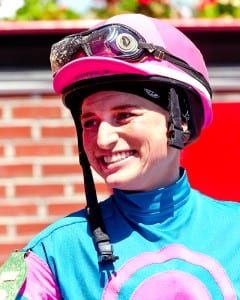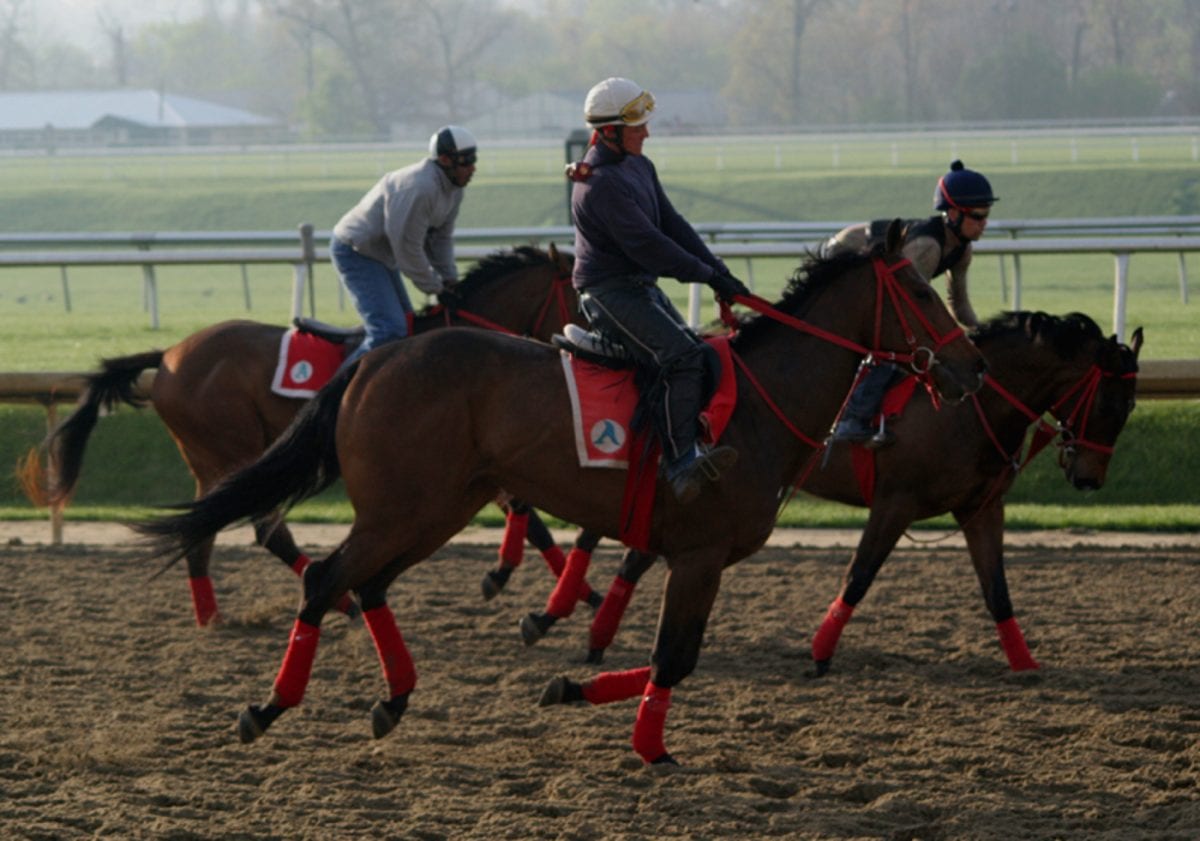by Teresa Genaro
Talk to most of the jockeys around your local racetrack, and you’ll find that they’ve taken one of a few paths to get to where they are. They grew up around horses; they started riding at a young age; they attended a jockey academy.
Talk to jockey Samantha Colvin, and you’ll get quite a different story.

Samantha Colvin was all smiles after notching her first win. Photo by Jim McCue, Maryland Jockey Club.
The 26-year-old from Williamsport, Pennsylvania didn’t get near a horse until she was in her early 20’s; she didn’t get on one until a couple of years later. And on May 2, at age 28, she got her first win when she piloted Rocket Ninetyeight to victory in the first race at Pimlico. It was her fifth career mount.
After graduating from high school in 2005, Colvin briefly attended Penn State University on a scholarship; a competitive runner and swimmer in high school, she ran in Penn State’s program until an illness sidelined her. The following fall she enrolled at Mercyhurst College in Erie, Pennsylvania, and attempted to revive her running career; unable to do so, she left after one semester.
“Running identified me for a long time,” said Colvin recently, speaking by phone from Colonial Downs, where she had driven from Maryland to work some horses. “When I couldn’t do that anymore, I lost my identity.”
Unsure of what she wanted to study and without the focus of running, she decided against staying in college and joined the Army, wanting to serve her country.
“I thought it would be good for me to get out on my own, do something I felt good about, be independent, and travel a little bit,” she said.
Serving a three-year stint, from January 2007 through summer 2010, she worked in a communications network in a branch of the intelligence services. She answered questions about her work cagily, ultimately declining to be specific but indicating that she took advantage of Mercyhurst’s ROTC and intelligence programs in 2009 and 2010.
And while her travel opportunities were a little more limited than she might have initially imagined—she spent most of her time in Texas—she’s not altogether unhappy about the way things turned out.
“I never got deployed overseas, and looking back, that’s probably a good thing,” she admitted.
Back home in Pennsylvania, trying to figure out whether to return to school, she went with a friend to the casino at Presque Isle Downs in the summer of 2010. Noticing the horse racing, she thought to herself, “That’s kind of cool. That’d be fun to do.”
“I had no clue about anything,” she said. “I couldn’t tell you the ass end of a horse.”
[pullquote]I’m blessed,” Colvin says, “with how far things have come for women. The women before me had a lot of problems doing this, and they paved the way, creating opportunities.”[/pullquote]Undeterred, she started to talk to people. She did research. She went to a stable that was near the track and started, she said, “just hanging out,” doing work around the barn and learning about horses. Eventually, at the suggestion of some friends who own horses, she got a job as a hotwalker.
“They suggested it and I said, ‘What’s a hotwalker?’” she remembered with a laugh.
After she mastered hotwalking, she started getting on horses, learning how to saddle them, going on trail rides. At the end of the meet, she headed south to learn how to ride.
She had investigated other options to further her career, but her decision to go to Florida was ultimately a question of finances.
“I didn’t have the extra money to pay for lessons. I looked into the McCarron school,” she said, referring to the North American Riding Academy in Lexington, “but that was a lot of money, and going to Ocala meant that I’d get paid while I learned.
“I gave it a shot and thankfully it worked out. It wasn’t easy, though—I fell off a lot. It was pretty rough for a while.”
She had by this time abandoned thoughts of going to college, not necessarily an easy decision for a woman who describes herself as “very studious.”
“I always thought I’d go, but when the time came, it didn’t appeal anymore,” she said, in part because of the lingering memories of her aborted running career, in part because of her involvement with horses.
After a winter in Florida, she came back to the Mid-Atlantic and settled in Maryland, where she’s been for about a year. She began as a freelance exercise rider, and her break came at the end of April.
Walking around the backside one morning trying to get rides, she found herself in a “right place, right time” moment when a jockey didn’t show up to work a horse.
“I’ll work her for you,” she offered, and trainer Naoise Agnew took her up on it.
“The work went well and the trainer said, ‘Do you want to ride her?’” Colvin recounted.
She and Moonovermanhattan finished third by less than two lengths in the second race on April 27, and five days later, she got her first win, for owner/trainer Calvin Barth.
She’s had her share of lucky breaks, and some unlucky ones; she was seen recently walking around the track with a couple of black eyes as she recovered from minor injuries after a gate incident landed her in the hospital. She’d gotten knocked in the face when her mount broke, breaking her nose and requiring stitches.
“It could have been a lot worse,” she said. “I was lucky.”
She was riding again the next day, and as of Monday of this week, she’d won five races from 40 lifetime starts, with four seconds and five thirds and earnings of $88,203. Last Saturday, on closing day at Pimlico, she may have had her most eventful day in the saddle: Back aboard Rocket Ninetyeight, she finished second in the ninth race, only to be disqualified and placed last after bearing in on the first term. Two races later, riding Sleep Like a Rock, she dead-heated for the win.
Colvin may be new to the racing game, but she thrives on the challenge and competition in being a jockey, which recall her earlier athletic experiences. She’s also motivated by the obvious disadvantages of her position—her lack of experience, for one. Her age, for another. Her sex, for a third.
“I love to beat the boys,” she admitted. “I have fun doing that.”
[pullquote]“I didn’t have the legs to run anymore,” Colvin says, “but the horses do.”[/pullquote]“And I’m blessed,” she continued, “with how far things have come for women. The women before me had a lot of problems doing this, and they paved the way, creating opportunities.”
She acknowledges that her age has presented a sometimes-daunting obstacle. “This is a young person’s game,” she said. “People are starting at 17, 18, 19; I was 24 and I didn’t know anything. A lot of people said that I wouldn’t even get the opportunity because of my age.”
She has gotten it, though, and she’s making the most of it. She had four mounts last Saturday, and for now, she plans to stay in the Mid-Atlantic region. She’s been a runner and a swimmer, a student and a soldier, and now, in the horses and at the racetrack, she thinks that she’s found the identity that she’d lost when she became ill.
“I didn’t have the legs to run anymore,” she said, “but the horses do.”








Samantha just keepin’ hope alive. You go girl.